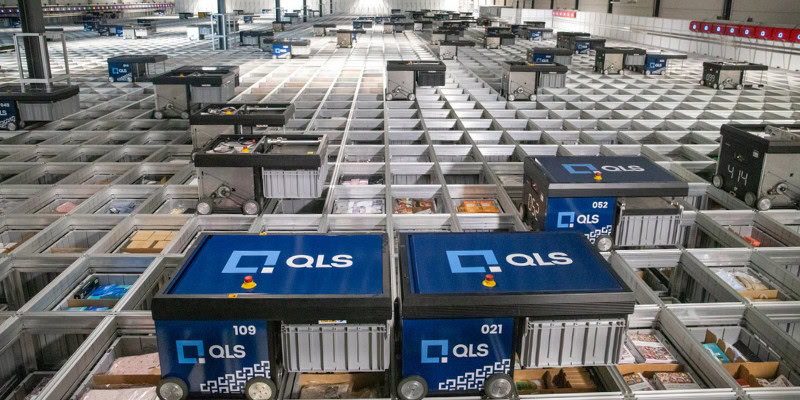Introduction: The invisible force behind a webshop
A successful webshop doesn’t just depend on attractive design or smart marketing campaigns. The real challenge begins once a customer places an order: logistics. The faster, cheaper, and more error-free your deliveries are, the greater the chance that customers will return.
That’s why more and more webshops choose to outsource their logistics to a fulfilment partner like QLS. This is also known as 3PL (Third-Party Logistics). It saves time, reduces costs, and provides access to advanced systems and international shipping networks.
In this article, you will discover:
- What it really means to outsource webshop logistics
- The advantages and possible drawbacks
- Which tasks you can hand over to a fulfilment partner
- How to choose the right logistics partner
- Cost models and what to look for in contracts
- Future trends in e-commerce fulfilment
What does it mean to outsource your webshop logistics?
Outsourcing webshop logistics means that the operational processes behind your webshop – such as storage, order picking, packing, shipping, and returns management – are handled by a specialized logistics service provider. Your webshop continues to manage sales and marketing, while an external partner ensures every order reaches the customer neatly, quickly, and at low cost.
Tasks you can outsource:
- Inventory management and storage in a professional warehouse
- Order picking & packing (collecting and packaging orders)
- Shipping via multiple carriers (PostNL, DHL, UPS, DPD, etc.)
- Returns logistics and processing of returned products
- Logistics-related customer service (track & trace, delivery times, return status)
- Reporting & analytics on inventory, lead times, and shipping performance
Advantages of outsourcing logistics
1. Time savings and focus on growth
As an entrepreneur, you spend less time packing boxes and dropping off parcels. You can better invest that time in marketing, product development, or customer retention.
2. Lower costs through economies of scale
Fulfilment partners process thousands of parcels daily and therefore have strong shipping contracts with carriers. This allows you to benefit from lower shipping costs and more efficient processes.
3. Improved customer experience
Fast delivery times, track & trace, and reliable returns handling lead to higher customer satisfaction and better reviews.
4. Flexibility during peak periods
During busy seasons such as Black Friday or the holidays, a fulfilment partner can easily scale up with extra staff and capacity.
5. International opportunities
Many fulfilment companies have networks and contracts that make it easy to ship abroad, without you having to manage customs processes yourself.
Possible drawbacks and points of attention
Although the advantages are significant, there are also challenges:
- Cost structure: smaller webshops may find the fixed costs high.
- Less direct control: you no longer have physical oversight of your stock.
- Dependence: switching to another fulfilment partner can take time and effort.
- Complex integration: a good connection between webshop software and the warehouse management system (WMS) is essential.
When is it smart to outsource logistics?
Not every webshop is immediately ready to outsource fulfilment. Some signals that it would be beneficial include:
- You process more than 100 orders daily.
- Your inventory takes up too much space at home or in your own warehouse.
- You spend more time on order processing than on marketing and growth.
- You want to start shipping internationally.
- You struggle to get everything shipped on time during peak periods.
Costs of outsourcing webshop logistics
The cost structure of fulfilment often consists of:
- Inbound fees: for receiving and registering products in the warehouse.
- Storage fees: price per pallet, per bin, or per m² per month.
- Pick & pack fees: a fee per order line or per item collected.
- Shipping costs: depending on the carrier, size, and destination.
- Returns fees: for processing returns, including inspection and possible repackaging.
How to choose the right fulfilment partner?
1. Scale and specialization
Choose a partner who understands your product category – whether it’s fashion, electronics, or FMCG.
2. Technology integrations
Check whether the partner can seamlessly connect with your webshop platform (Shopify, WooCommerce, Bol.com, etc.).
3. Location and reach
A centrally located warehouse can shorten delivery times and reduce shipping costs.
4. Flexibility and service
How quickly can the partner scale during peak times? How accessible is their customer service?
5. Transparency and reporting
A good fulfilment company provides real-time insights into stock levels, order status, and shipping performance.
Trends in e-commerce logistics
- Same-day delivery: more and more consumers expect delivery within just a few hours.
- Sustainable logistics: CO₂-neutral shipping and reusable packaging are becoming increasingly important.
- Robotics & automation: think AutoStore, AGVs, and AI-driven picking systems.
- Cross-border e-commerce: international shipping networks are becoming more accessible to smaller webshops.
- Data & AI: demand forecasting and smart inventory management powered by algorithms.
Conclusion: Outsourcing logistics as a growth accelerator
For many webshops, outsourcing logistics is not just a cost, but a growth accelerator. It provides economies of scale, better customer experiences, and more time to focus on marketing and strategy.
Whether you are a starting entrepreneur growing out of your garage or an established webshop looking to expand internationally – a reliable fulfilment partner can make the difference between standing still and moving forward.
Frequently Asked Questions (FAQ)
1. From how many orders per month does outsourcing fulfilment pay off?
Usually from around 3,000 orders per month, depending on product type and margins.
2. Can I outsource only my shipping?
Yes, some companies only offer shipping platforms. Full fulfilment goes further and also takes care of storage and picking.
3. How quickly can I switch to a fulfilment partner?
Depending on the size, this can take 2–6 weeks (moving stock, testing integrations).
4. Is outsourcing logistics also interesting for small webshops?
Yes, but the costs can be relatively high. It often becomes more attractive as you grow. A first step to saving can be to look at parcel service solutions.
